
by Elizabeth Atalay | Jun 24, 2014 | 2014, Africa, Awareness, Babies, Birthing, Ethiopia, Health, Humanitarian, Maternal Health, Millennium Development Goals, Motherhood, Newborn Health, Pregnancy, Save The Children, Social Good, Third Eye Mom, Travel, World Moms Blog, World Voice
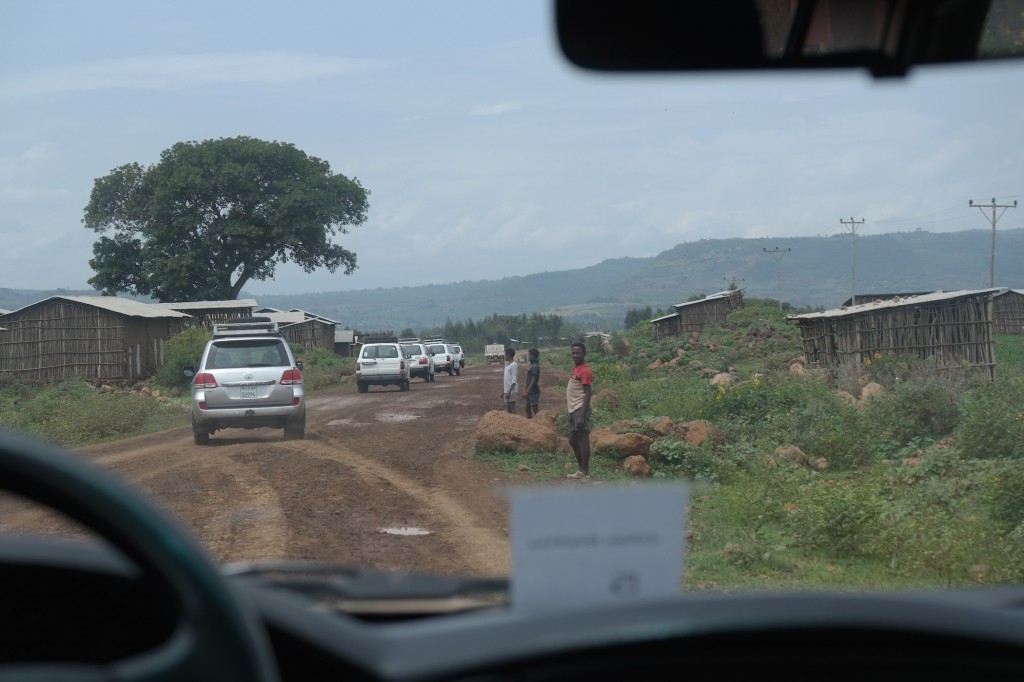
We had just spent the night at the source of the Blue Nile River. Lake Tana sits in Bahir Dar, Ethiopia, and as our caravan of Land Cruisers wove through the countryside from Bahir Dar to Mosebo I took in deep gulping breaths of sweet fresh Ethiopian air. The lush colors of our surroundings looked to me like they had been enhanced in Photoshop in the way that everything seemed to pop. How could I feel this emotional connection to place that was never mine? A place I had never been?
Though this is my first time in Ethiopia, the verdant landscape brought me back to other rural parts of Africa I’d traveled through in my youth, similar topographies that had stayed with me ever since. This time I’d returned to the continent as a new media fellow with the International Reporting Project to report on newborn health. World Moms Blog Editor Nicole Melancon of ThirdEyeMom is a fellow on the trip as well, and last week wrote about our initial overview of maternal and newborn health in Ethiopia. Now we were heading to one of the villages housing a Health Post, which serves the local and surrounding population of approximately 3,500 people.
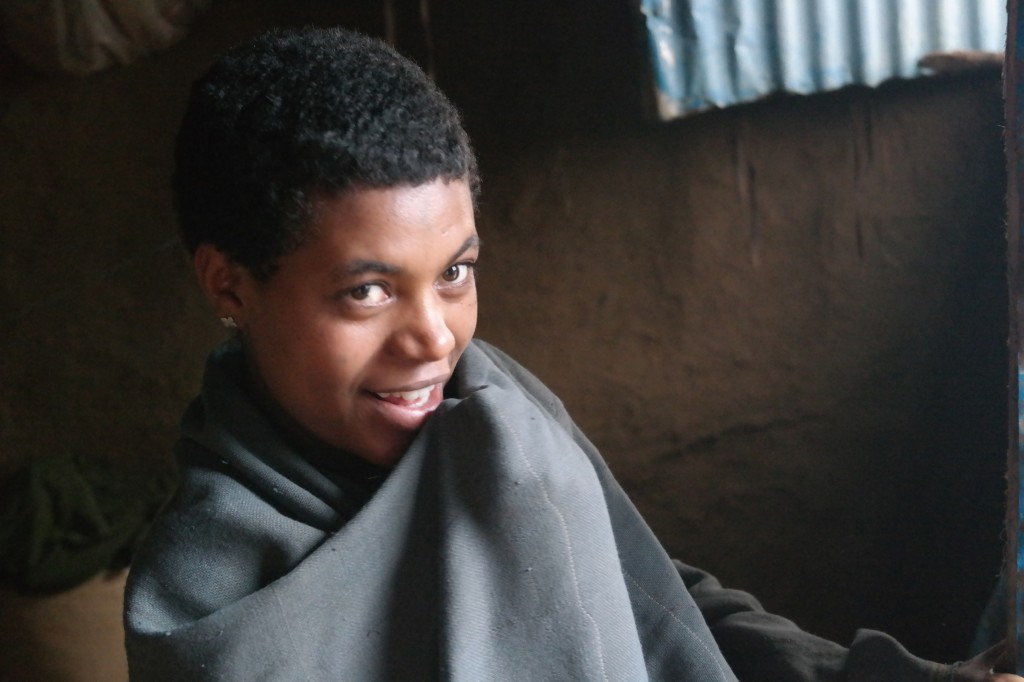
Mosebo Village is part of Save The Children’s Saving Newborn Lives program, and as such is looked to as a model village in the Ethiopian Government’s plan to reduce maternal and newborn mortality. Mosebo is a rural agrarian community that produces wheat, teff and corn. There I met seven-year-old Zina whose mother, Mebrate was about to give birth. Through our translator Mebrate estimated her age to be around 26, and told us that Zina was her first child. For economic reasons she and her husband had waited to have a second. When she had Zina, Mebrate had gone to her parent’s home to give birth, as women in Ethiopia often do. It is estimated that 80% of Ethiopian mothers will give birth in their home, often without a trained health care attendant. Towards the end of Mebrate’s first pregnancy she went to live with her parents as her family instructed, until after the baby was born. In that way her mother could help her deliver, could care for her and the baby, and feed her the traditional porridge after birth. Although there were no complications during her delivery, sadly, many young mothers giving birth at home are not as fortunate. The time period during and around birth are the most vulnerable for the lives of both the mothers and babies. The Saving Newborn Lives Program aims to reduce maternal and newborn mortality beginning with awareness programs and antenatal care on the local level at Health Posts like the one we visited in Mosebo.
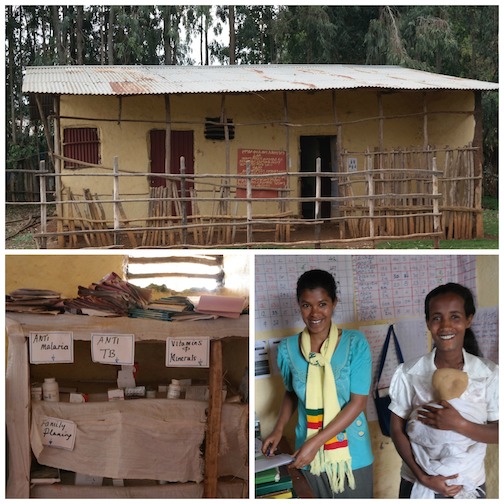
The Mosebo Health Post and Health Extension Workers
We had met Tirgno and Fasika, the two Health Extension Workers at the Mosebo Health Post earlier that day as they showed us the two room interior, and explained their role in improving maternal and newborn health. They work to raise awareness in the community about the importance of antenatal care, and the potential dangers of giving birth at home for both mother and child. Newborn health is interdependent with maternal health, and the most prevalent causes of newborn mortality, infection, Asphyxiation, pre-maturity or low birth weight, and diarrhea can often be avoided with proper care. These days in Mosebo after receiving antenatal care at the Health Post women are then referred to the regional Health Center for deliveries.
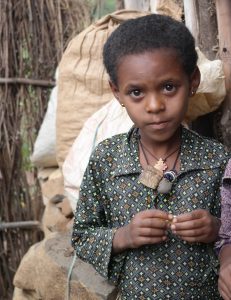
Zina shyly smiled when we ask her how she felt about having a new sibling, she stood straight and tall listening intently as we asked her mother about the babies’ arrival. When Mebrate goes into labor this time, with her second child, she will embark on the walk along rural dirt roads for around an hour to the nearest Health Center to give birth.
Elizabeth Atalay is reporting from Ethiopia as a fellow with the International Reporting Project (IRP). This is an original post written for World Moms Blog.
You can follow all IRP reports by World Moms Elizabeth Atalay & Nicole Melancon at #EthiopiaNewborns

Elizabeth Atalay is a Digital Media Producer, Managing Editor at World Moms Network, and a Social Media Manager. She was a 2015 United Nations Foundation Social Good Fellow, and traveled to Ethiopia as an International Reporting Project New Media Fellow to report on newborn health in 2014. On her personal blog, Documama.org, she uses digital media as a new medium for her background as a documentarian. After having worked on Feature Films and Television series for FOX, NBC, MGM, Columbia Pictures, Warner Brothers, 20th Century Fox, and Castle Rock Pictures, she studied documentary filmmaking and anthropology earning a Masters degree in Media Studies from The New School in New York. Since becoming a Digital Media Producer she has worked on social media campaigns for non-profits such as Save The Children, WaterAid, ONE.org, UNICEF, United Nations Foundation, Edesia, World Pulse, American Heart Association, and The Gates Foundation. Her writing has also been featured on ONE.org, Johnson & Johnson’s BabyCenter.com, EnoughProject.org, GaviAlliance.org, and Worldmomsnetwork.com. Elizabeth has traveled to 70 countries around the world, most recently to Haiti with Artisan Business Network to visit artisans in partnership with Macy’s Heart of Haiti line, which provides sustainable income to Haitian artisans. Elizabeth lives in New England with her husband and four children.
More Posts

by Dee Harlow (Laos) | May 29, 2014 | Awareness, Breastfeeding, Food, Health, Humanitarian, Laos, Maternal Health, Millennium Development Goals, Nutrition, Uncategorized, World Voice, Younger Children
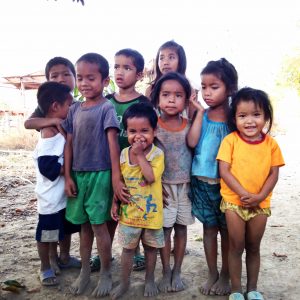 While I still have the opportunity to write another post for the WMB community before leaving Laos later this year, I feel compelled to tell you about child nutrition and the problem of stunting in Laos because stunting is a seemingly invisible problem that can go unnoticed unless special attention is drawn to highlight the issue.
While I still have the opportunity to write another post for the WMB community before leaving Laos later this year, I feel compelled to tell you about child nutrition and the problem of stunting in Laos because stunting is a seemingly invisible problem that can go unnoticed unless special attention is drawn to highlight the issue.
Ethnically, most Southeast Asian people are shorter and have a smaller frames than most other races throughout the world. This fact makes it easy to say that Lao babies and children tend to be small or smaller because of their race.
Yet at first glance Lao children appear to be healthy (and super cute), a closer look and personal interaction will almost always reveal that the children are a few years older than what you had first assumed. I recently met an adorable girl in a northern village at a school where I delivered books by boat since there is no road access to her village. Upon speaking with her (in Lao) I was impressed by how well behaved, articulate and “mature” she was for what I assumed to be a 6-year old. (I have two 4-year old twins so I was instantly optimistic about their potential in just two short years to be as well behaved as this girl.) She turned out to be 10-years old. This has happened time and time again to me, to my colleagues, and to many newcomers to Laos.
Lao children are among the most undernourished in Southeast Asia with 44% stunting of children under 5-years old. It is the single largest contributor to infant and child mortality in the country with 59% of all child deaths related to nutritional deficiencies. Chronic malnutrition predisposes children to higher morbidity and mortality, lower educational attainment, and reduced workforce productivity.
For a country experiencing rapid economic growth and increasing income disparities, fierce external human resource competition puts the country at risk of leaving a majority of the Lao population behind others who will be more able to keep apace. Stunting is a problem that needs be addressed for the immediate wellbeing of Lao children and to be resolved for the future potential of the Lao people.
The Lao government is working closely with experts and development partners on how to tackle this important issue. It is not easy. Poor breast-feeding and weaning practices are widespread. Almost all mothers give food supplements (such as chewed glutinous rice), and pure water, to infants within a few weeks of birth. Harmful practices (such as discarding colostrum) and other food taboos for pregnant women reduce disease resistance for newborns and increase fetal undernutrition. Micronutrient deficiencies, inadequate intake of vitamin A, anemia and iodine deficiency, all further hinder child development.
The current health system is not only faced with challenges of delivering micronutrients, immunizations and necessary vitamins to the most vulnerable population, but they are additionally burdened by the daunting task of changing people’s behaviors to improve dietary habits, increase nutritional intake, and overcoming cultural belief and religious belief obstacles to improved nutrition status among rural and multi-ethnic communities. The task is daunting.
What is being done and what needs to be done?
There are some great organization here making slow but successful strides on a small-scale basis. UNICEF, WFP, IFAD, Save the Children, the Scale Up Nutrition initiative and others who are collaborating closely with government health officials, but resources are scarce, especially in an often overlooked country like Laos.
- We can channel financial support to these organizations for their work on nutrition in Laos.
- We can lobby our governments to increase foreign assistance resources to address the poor state of healthcare in Laos (e.g., Laos is not one of the United States’ ‘priority countries’ receiving Global Health Initiative (GHI) funding. Ask U.S. representatives, Why not?)
- We can voice our concern to private and public interests who are taking advantage of opportunities in Laos to improve their social welfare practices by investing in better healthcare in communities where they pursue their business interests.
- We can ask the question to anyone willing to listen about who should be accountable to improving the welfare of children beginning their lives under such great odds in Laos.
Hopefully someday, someone will listen and take action.
This is an original post to World Moms Blog by our mother of twins writer, Dee Harlow in Vientiane, Laos. You can always find her writing on her blog, Wanderlustress.
Photo credit attributed to the author.
One of Dee’s earliest memories was flying on a trans-Pacific flight from her birthplace in Bangkok, Thailand, to the United States when she was six years old. Ever since then, it has always felt natural for her to criss-cross the globe. So after growing up in the northeast of the US, her life, her work and her curiosity have taken her to over 32 countries. And it was in the 30th country while serving in the Peace Corps in Uzbekistan that she met her husband. Together they embarked on a career in international humanitarian aid working in refugee camps in Darfur, Sudan, and the tsunami torn coast of Aceh, Indonesia.
Dee is now a full-time mother of three-year old twins and continues to criss-cross the globe every two years with her husband who is in the US Foreign Service. They currently live in Vientiane, Laos, and are loving it! You can read about their adventures at Wanderlustress.
More Posts

by Ecoziva (Brazil) | Apr 7, 2014 | Brazil, Environment, Millennium Development Goals, Nature, Social Good, Uncategorized, World Interviews, World Motherhood
This post follows up on WMB’s eight-month campaign to raise awareness for the eight Millennium Development Goals (MDGs). In this post, we reflect on MDG #7: Ensure Environmental Sustainability. The following is an interview with Silvio Rocha Sant’Ana, president of the Esquel Group.

World Moms Blog: What are some examples of how the Esquel Group supports environmental sustainability?
SRS: We have been working with other civil society organizations (CSOs) and governmental institutions in the fields of adapting to climate change, combating desertification (in Northeast Brazil), designing proposals for public policies on these matters, and dialoguing directly with financial agencies (public and private) in order to make them more adjusted to sustainability criteria.
How can mothers help support your organization in achieving MDG #7?
SRS: It is a new question for me. Thinking aloud: mothers have a fine sense of survival and can operate in adverse conditions much better than men. We work with a lot of very poor mothers (especially at the Pastoral da Criança and the microfinancing project). The way they think (and act), their relationship to the environment, the ability to allocate resources in the difficult social conditions they live in – all of this is a continuous lesson we can learn from. In fact, it would be interesting to have an environment that would enable us to maximize their teachings and contributions.
What countries does the Esquel Group mainly work in?
Silvio Rocha Sant’Ana: Esquel is currently active in the USA, Ecuador and Brazil. Each organization is independent, and defines its own agenda; we have common concerns and themes.
How does Esquel Group bridge the gap of joining people in economic development?
SRS: We have developed many activities in different fields. In Brazil we have focused in the Northeast region (where there are severe environmental and social restrictions), on children aged 0-6 years in Brazil, and in the field of technical support. We also work closely with the Pastoral da Criança, including microfinancing for employment and income generation (mainly for women).
What is the Esquel Task Force?
SRS: The Esquel Task force is an initiative from the USA Esquel Group and fosters dialogue, advocacy and lobbying among American and Latin American organizations.
Is there a specific example in Brazil where Esquel made a big impact when it came to the environment?
SRS: There is a very famous Project in Brazil called “1 million cisterns” – tanks to collect rain water in the semi-arid region of Brazil. Esquel has had a leading role in building up this project and the related public policies. It is considered an extraordinary and successful case of public-private cooperation and has mobilized, to date, more than US$200 million. It is a project managed entirely by CSOs and its main goal is to create a new pattern of social wellbeing in the semi-arid region, with full respect to environmental conditions.
What would you say are the greatest environmental issues facing Brazil today?
SRS: Adaptation to climate changes and associated cultural adjustments within an “economic and social environment”, which favors “economic growth” above all things (including social and environmental welfare).
What is the unifying theme of all Esquel’s activities worldwide?
SRS: The unifying theme of Esquel’s activities is the strengthening of civil society, specifically citizen organizations that further democracy.
This is an original interview post for World Moms Blog by our writer in Brazil, EcoZiva.
For more about the Esquel Group, visit their website at http://esquel.org/.
Eco, from the greek oikos means home; Ziva has many meanings and roots, including Hebrew (brilliance, light), Slovenian (goddess of life) and Sanskrit (blessing). In Brazil, where EcoZiva has lived for most of her life, giving birth is often termed “giving the light”; thus, she thought, a mother is “home to light” during the nine months of pregnancy, and so the penname EcoZiva came to be for World Moms Blog.
Born in the USA in a multi-ethnic extended family, EcoZiva is married and the mother of two boys (aged 12 and three) and a five-year-old girl and a three yearboy. She is trained as a biologist and presently an university researcher/professor, but also a volunteer at the local environmental movement.
More Posts

by Elizabeth Atalay | Feb 18, 2014 | 2014, Environment, International, Millennium Development Goals, Social Good, Uncategorized, United Nations, Water, World Moms Blog, World Voice

In 2000, 189 nations made a promise to free people from extreme poverty and multiple deprivations. This pledge turned into the eight Millennium Development Goals, and was written as the Millennium Goal Declaration .- United Nations Development Programme
The goal of MDG #7 is to ensure environmental sustainability. This month we are thrilled to continue our #Moms4MDG campaign by joining forces with Esquel Foundation in Brazil.
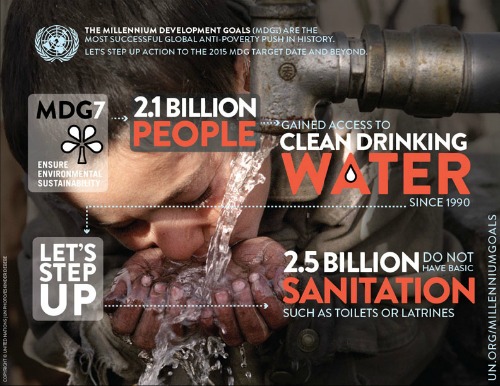
The goals of Millennium Development Goal # 7 are:
- Make sustainable development part of the policies and programs of governments and reverse the loss of environmental resources.
- Reduce and slow down biodiversity loss.
- By 2015 half the proportion of the population without sustainable access to safe drinking water and basic sanitation.
- By 2020, achieve a significant improvement in the lives of at least 100 million people who live in slums.
To tackle MDG # 7 we have partnered with The Esquel Foundation:
The Esquel Group (EG) is a private non-profit organization founded in 1984 and dedicated to stalwart citizenship as the common element in sustainable democracy and sustainable economic development. It is a member of the Grupo Esquel network with associate entities in Argentina, Brazil, Ecuador, Honduras and Uruguay. Its focus is strongly—though not exclusively—Latin American. It receives its support from contracted work and from donations from private, public and multilateral sources.Through seminars, presentations and training programs EG promotes national policies as well as grassroots initiatives dedicated to social inclusion and sustainable development. It fosters inquiry and action towards self governance and greater citizen engagement in public life, particularly at the local level. EG organizes a periodic policy seminar in Washington DC and conducts training on social entrepreneurship for community development, with particular focus on practices for strengthening the structure and functions of civil society networks, deliberative democracy and conflict management skills.- www.esquel.org
Meet us over at the Esquel Group blog today to read the guest post by World Moms Blog contributor Andrea Steiner! You can read her full post, here:
We will be co-hosting our#Moms4MDGs Twitter Party with Esquel Foundation, Girls Globe, and Multicultural Kid Blogs tomorrow, February 19th from 1-2pm EST to talk environment, so please join us!
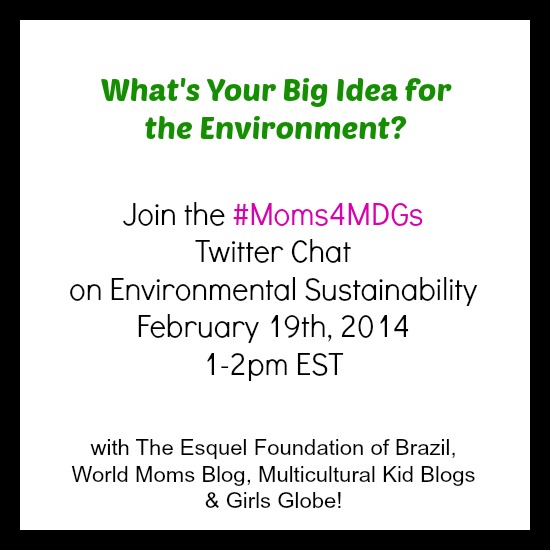
P.S. Never been to a twitter party before? Go to www.tweetchat.com and put in the hashtag: “#Moms4MDGs during the party times. From there you can retweet and tweet, and the hashtag will automatically be added to your tweets. You can view all of the other party tweets at that hashtag as well!
This is an original post to World Moms Blog by World Voice Editor, Elizabeth Atalay of Documama in Rhode Island, USA.

Elizabeth Atalay is a Digital Media Producer, Managing Editor at World Moms Network, and a Social Media Manager. She was a 2015 United Nations Foundation Social Good Fellow, and traveled to Ethiopia as an International Reporting Project New Media Fellow to report on newborn health in 2014. On her personal blog, Documama.org, she uses digital media as a new medium for her background as a documentarian. After having worked on Feature Films and Television series for FOX, NBC, MGM, Columbia Pictures, Warner Brothers, 20th Century Fox, and Castle Rock Pictures, she studied documentary filmmaking and anthropology earning a Masters degree in Media Studies from The New School in New York. Since becoming a Digital Media Producer she has worked on social media campaigns for non-profits such as Save The Children, WaterAid, ONE.org, UNICEF, United Nations Foundation, Edesia, World Pulse, American Heart Association, and The Gates Foundation. Her writing has also been featured on ONE.org, Johnson & Johnson’s BabyCenter.com, EnoughProject.org, GaviAlliance.org, and Worldmomsnetwork.com. Elizabeth has traveled to 70 countries around the world, most recently to Haiti with Artisan Business Network to visit artisans in partnership with Macy’s Heart of Haiti line, which provides sustainable income to Haitian artisans. Elizabeth lives in New England with her husband and four children.
More Posts

by Olga Mecking | Feb 3, 2014 | 2014, Awareness, Being Thankful, Bilingual, Culture, Education, Expat Life, Humanitarian, Inspirational, Language, Life Lesson, Living Abroad, Millennium Development Goals, Motherhood, Moving, Netherlands, Philanthropy, Shot@Life, Social Good, Stress, World Motherhood
 Until a friend of mine had a terrible tragic accident in the Himalaya mountains that left her in a coma, I had never donated to a charity. We collected some money at our wedding to give to her husband, and my mom also donated some money to a charity that takes care of her, but that was it.
Until a friend of mine had a terrible tragic accident in the Himalaya mountains that left her in a coma, I had never donated to a charity. We collected some money at our wedding to give to her husband, and my mom also donated some money to a charity that takes care of her, but that was it.
Since moving to another country and having children, I have been looking for ways to help others. I want to donate to more charities. I am just looking for the right one.
It isn’t easy. I have heard of many charities that have turned out to be scams or which just took people’s money and ran.
My situation is especially difficult because I live in a foreign country and do not know about the charities here. Though my Dutch is fluent, I still have trouble communicating in this language sometimes. In the Netherlands, many people go house-to-house collecting money for charities.
I think it is interesting to find out about charities that way because they’re often ones I’ve never heard of before. They are often small scale actions rather than big ones. But I think the mistake they’re making is the following one: before I contribute, I’d like to find out more about the organization, whether my friends have heard of it, whether there is something about them that raises red flags.
I think I might even agree to donate money if they were willing to leave a business card or something I could find them by. Instead, they want me to make a monthly commitment. Again, because I do not know them, I am not so keen on giving them my credit card number.
At the same time, my heart breaks for all the little children going through invasive treatments; who are terminally ill; who look like little ghosts because they have lost so much weight from all their chemo; for all the sick people who can’t get the treatment they need; or for children who are not so fortunate as mine; or moms in poorer countries, who have to travel for many days if they want to give birth in a hospital.
I really want to help. Since I became a mom and later a World Moms Blog contributor, I have been made aware of needs and dreams that can’t be fulfilled because of the bad conditions all around the world.
But the fact is that finding the right charity isn’t easy. I mostly say no to these door-to-door people. I do it with a heavy heart. I just want to make sure that I am really helping people in need, and not wasting my money.
Luckily, while looking for a charity to donate to, there is a lot I can do:
- In my circle of friends alone, there have been situations where help was needed, including domestic violence and pregnancy problems.
- I am considering taking the Shot@Life pledge and becoming a Champion.
- I can learn as much as I can about actions such as #MDG’s and participate in our Twitter Parties.
- I can find local communities, organizations, charities and brands.
- Many of my friends are absolutely talented people and use their talents to collect money for a good cause, and I can help them spread the word and participate.
I know this sounds like nothing, and I am not telling this to show off how good of a person I am. It is just to show that even though it sounds like nothing, we all can make a difference. I am still very new at this social good cause. I still have a lot to learn. Already I have asked my fellow World Moms Blog contributors for help choosing a charity I can actually trust and they have come up with great charities.
I need to do more. I want to do more. I will do more.
Do you have a charity or cause worth supporting? Tell us about it and help spread the word
This is an original post to World Moms Blog from Olga Mecking in The Netherlands.
The image used in this post is credited to Images Money. It holds a Flickr Creative Commons attribution license.
Olga is a Polish woman living in the Netherlands with her German husband. She is a multilingual expat mom to three trilingual children (even though, theoretically, only one is trilingual since she's old enough to speak). She loves being an expat, exploring new cultures, learning languages, cooking and raising her children. Occasionally, Olga gives trainings in intercultural communication and works as a translator. Otherwise, you can find her sharing her experiences on her blog, The European Mama. Also take a while to visit her Facebook page .
More Posts - Website
Follow Me:




by Elizabeth Atalay | Jan 14, 2014 | 2014, AIDS, Health, Humanitarian, Malaria, Millennium Development Goals, Social Good, Vaccines, World Moms Blog, World Voice

In 2000, 189 nations made a promise to free people from extreme poverty and multiple deprivations. This pledge turned into the eight Millennium Development Goals, and was written as the Millennium Goal Declaration .- United Nations Development Programme
The goals of MDG #6 are to combat HIV/AIDS, Malaria, and Other Diseases. This month we are thrilled to continue our #Moms4MDG campaign by joining forces with The Bill & Melinda Gates Foundation to take on the topic of preventable infectious diseases.
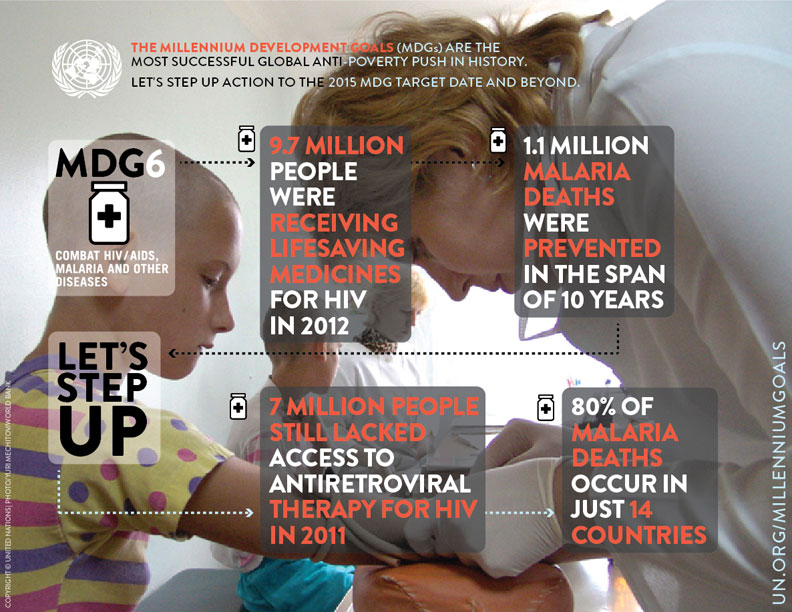
The goals of Millennium Development Goal # 6 are:
- A. To Have halted by 2015 and begun to reverse the spread of HIV/AIDS
- B. By 2010, to have achieved universal access to treatment for HIV/AIDS for all those who need it
- C. To have halted by 2015 and begun to reverse the incidence of malaria and other major diseases
The Bill & Melinda Gates Foundation works tirelessly to support research, solutions and implementation towards improving global health.
Guided by the belief that every life has equal value, the Bill & Melinda Gates Foundation works to help all people lead healthy, productive lives. In developing countries, it focuses on improving people’s health and giving them the chance to lift themselves out of hunger and extreme poverty. In the United States, it seeks to ensure that all people—especially those with the fewest resources—have access to the opportunities they need to succeed in school and life.-www.gatesfoundation.org
Meet us over at the Bill & Melinda Gates Foundation blog Impatient Optimists today to read the guest post by World Moms Blog contributor Erin Threlfall!
We will be co-hosting two #Moms4MDGs Twitter Parties with The Gates Foundation, Multicultural Kid Blogs, InCulture Parent and Girls Globe tomorrow, January 15th at 1-2pm EST and 9-10pm EST, so please join us!
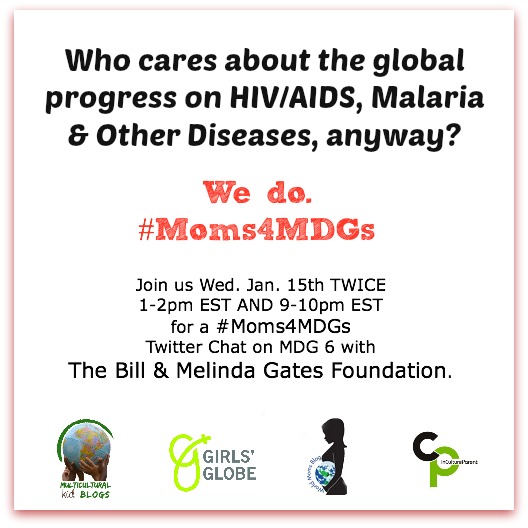
A big THANK YOU, to three amazing sites, Multicultural Kid Blogs, InCulture Parent and Girls Globe for joining us in the rally towards the UN’s Development Goals this month with The Bill and Melinda Gates Foundation!
P.S. Never been to a twitter party before? Go to www.tweetchat.com and put in the hashtag: “#Moms4MDGs during the party times. From there you can retweet and tweet, and the hashtag will automatically be added to your tweets. You can view all of the other party tweets at that hashtag as well!
This is an original post to World Moms Blog by World Voice Editor, Elizabeth Atalay of Documama in Rhode Island, USA.

Elizabeth Atalay is a Digital Media Producer, Managing Editor at World Moms Network, and a Social Media Manager. She was a 2015 United Nations Foundation Social Good Fellow, and traveled to Ethiopia as an International Reporting Project New Media Fellow to report on newborn health in 2014. On her personal blog, Documama.org, she uses digital media as a new medium for her background as a documentarian. After having worked on Feature Films and Television series for FOX, NBC, MGM, Columbia Pictures, Warner Brothers, 20th Century Fox, and Castle Rock Pictures, she studied documentary filmmaking and anthropology earning a Masters degree in Media Studies from The New School in New York. Since becoming a Digital Media Producer she has worked on social media campaigns for non-profits such as Save The Children, WaterAid, ONE.org, UNICEF, United Nations Foundation, Edesia, World Pulse, American Heart Association, and The Gates Foundation. Her writing has also been featured on ONE.org, Johnson & Johnson’s BabyCenter.com, EnoughProject.org, GaviAlliance.org, and Worldmomsnetwork.com. Elizabeth has traveled to 70 countries around the world, most recently to Haiti with Artisan Business Network to visit artisans in partnership with Macy’s Heart of Haiti line, which provides sustainable income to Haitian artisans. Elizabeth lives in New England with her husband and four children.
More Posts

























